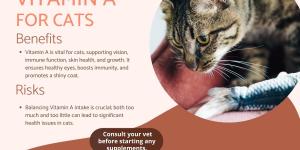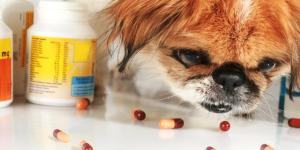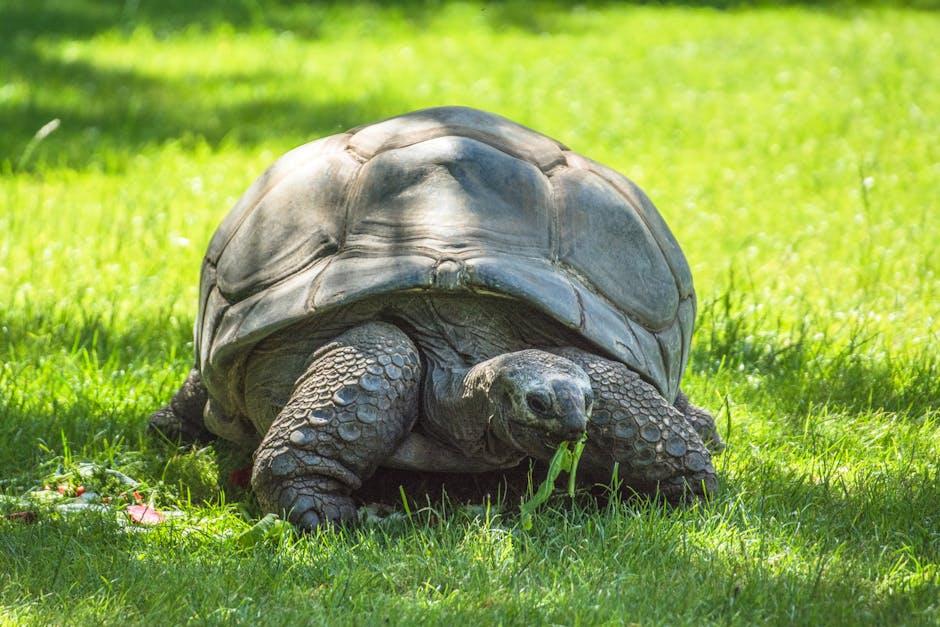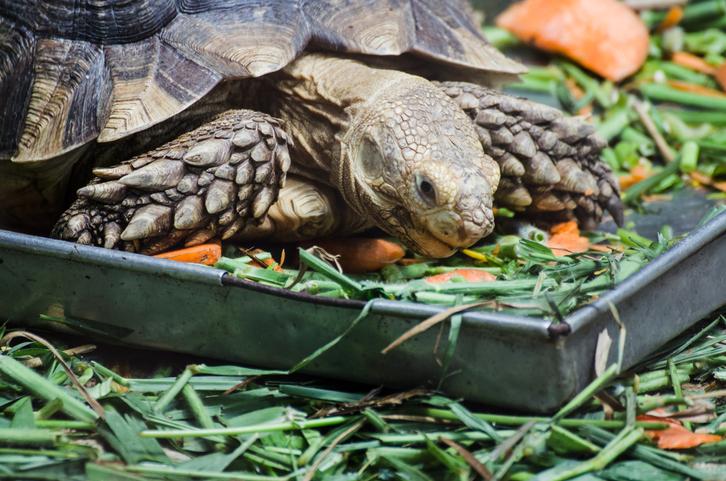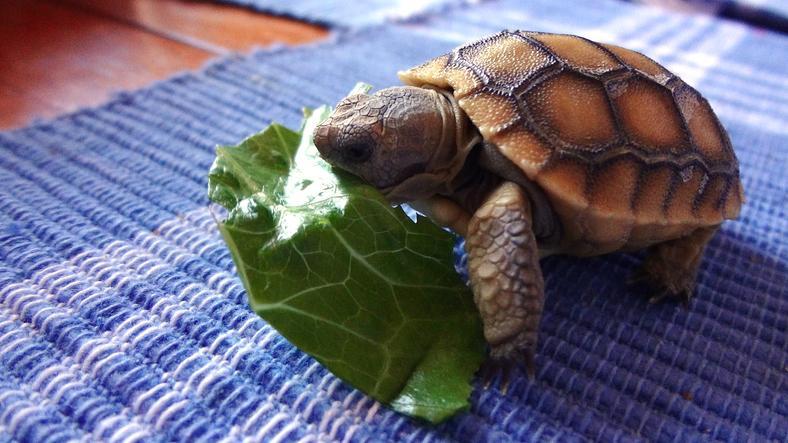What Is Vitamin A Deficiency in Tortoises?


Just like humans and other animals, tortoises rely on this essential vitamin for a variety of crucial bodily functions. In fact, vitamin A plays a vital role in keeping your tortoise healthy and thriving. Just like humans and other animals, tortoises rely on this essential nutrient for various bodily functions. While vitamin A is crucial, navigating the world of supplements and determining the correct dosage can be tricky. Overdosing on vitamin A can be toxic for tortoises.
In the upcoming AnimalWised article, we delve into the topic of vitamin A in tortoises. We'll cover dosage recommendations, signs of deficiency, and safe treatment options for tortoises.
Do tortoises need vitamin A?
Vitamin A, also known as retinol, plays a critical role in keeping your tortoise healthy. Vitamin A is involved in cell renewal throughout the body and helps maintain healthy mucous membranes in the mouth, lungs, and gut, which are crucial for proper function and fighting off infections. Vitamin A plays a role in immune function. Deficiency can make an animal more susceptible to infections and illnesses.
Not only that, but it also promotes healthy skin and shell growth, keeping them strong and resilient.
Furthermore, it supports healthy eyesight by aiding in the regeneration of rhodopsin, a pigment essential for night vision, and contributes to the overall health of the eye's choroid.
Tortoises, particularly those experiencing rapid growth from around six months old, have a heightened requirement for vitamin A. Failure to meet these needs can lead to hypovitaminosis A, a common condition among captive tortoises.
To safeguard your tortoise's overall health and prevent deficiencies, it's imperative as a caretaker to ensure they receive a balanced diet rich in vitamin A sources.
Vitamin A deficiency in tortoises
As we have seen, vitamin A, essential for various bodily functions in tortoises, can become deficient if not provided through their diet. The most common signs of vitamin A deficiency are:
- Swollen eyelids
- Lethargy
- Vision problems
- Poor growth in young tortoises
- Weak or soft shells
- Reduced appetite
- Weight loss
- Localized swelling
Most vitamin A deficiencies arise from a diet lacking essential nutrients. Tortoises fed primarily processed or dried foods, often low in beta-carotene (the precursor to vitamin A), are most at risk.
In some cases, even with a balanced diet, intestinal absorption issues, problems converting beta-carotene to vitamin A, or underlying metabolic factors can hinder proper vitamin A intake.
If you suspect a deficiency, consult a veterinarian for diagnosis and treatment.
Vitamin A dosage for deficient turtles
The amount (dosage) and method of administering vitamin A (oral or injection) depend heavily on your tortoise's specific needs. Several factors influence this decision, including:
- Species of tortoise
- Age of the tortoise
- Severity of the deficiency
- Overall health of the tortoise
Can turtles have too much vitamin A?
It is important to remember that Vitamin A can be toxic in high doses. Providing the wrong amount can cause serious health problems for your tortoise. For these reasons, it's vital to consult a licensed veterinarian if you suspect your tortoise has a vitamin A deficiency.
Potential signs of vitamin A toxicity if accidentally overdosed include:
- Loss of appetite
- Lethargy
- Weight loss
- Swelling of the limbs
- Mouth ulcers
- Bone deformities (in severe cases)
For more information on how to care for a pet tortoise, be sure to read this other article.

What foods are high in vitamin A for tortoises?
In most cases, a balanced diet should provide your tortoise with the essential nutrients it needs, including vitamin A precursors. Here's a breakdown of the key components:
Dark leafy greens (70-80%)
These should be the foundation of your tortoise's diet. They're packed with essential vitamins, minerals, and fiber, crucial for good health. Top choices include:
- Kale
- Dandelion greens
- Collard greens
- Mustard greens
- Turnip greens
Other vegetables (10-20%)
While not as rich in beta-carotene as leafy greens, offer a mix of chopped vegetables for additional nutrients and taste variety. Good options include:
- Bell peppers: especially red and orange, are rich in vitamin C and beta-carotene.
- Shredded carrots: they provide vitamin A precursors and some fiber.
- Butternut squash: it offers beta-carotene and some moisture.
- Green beans: they are good source of fiber and some vitamins.
Fruits (5-10%)
Due to their higher sugar content, fruits should only be offered as occasional treats. Some good choices with beta-carotene include:
- Strawberries: a source of vitamin C and some beta-carotene.
- Blueberries: rich in antioxidants and some vitamin A precursors.
- Raspberries: offer vitamin C and some fiber.
Freshness is key, so prioritize providing fresh vegetables and fruits whenever possible. Before offering any produce, remember to wash it thoroughly to remove dirt or pesticide residue.
Don't underestimate the importance of gut health. A healthy gut microbiome is essential for proper nutrient absorption.
Remember, portion sizes are not one-size-fits-all. Adjust the amount of food you provide based on your tortoise's age, size, and species. Their dietary needs will vary depending on these factors.
For a comprehensive understanding of tortoise health, check out our other article listing the most common tortoise illnesses.

How to give vitamin A to a tortoise?
While a balanced diet rich in vitamin A precursors is ideal, there might be situations where a veterinarian recommends supplementation. If your vet diagnoses a vitamin A deficiency, they will determine the safest and most effective treatment plan for your specific tortoise. The most common methods of supplementation include:
- Oral supplements: in some cases, your veterinarian might prescribe oral vitamin A supplements. These may come in liquid or powder form and require careful administration according to the vet's instructions.
- Injectable options: for severe deficiencies or situations where oral administration is difficult, injectable vitamin A might be necessary. This should only be performed by a qualified veterinarian.
Following successful treatment, long-term management focuses on two key aspects:
- Maintaining a balanced diet: as recommended by your veterinarian, continue providing a diet rich in vitamin A precursors. This ensures your tortoise gets the essential nutrients it needs to prevent future deficiencies and stay healthy.
- Regular veterinary checkups: scheduling regular checkups with your veterinarian allows them to monitor your tortoise's overall health. Early detection of any potential issues, including vitamin A deficiency recurrence, can lead to prompt intervention and better outcomes for your tortoise.
Thinking of adopting a tortoise? Our other article explores the fascinating types of tortoises you can welcome into your home.

If you want to read similar articles to What Is Vitamin A Deficiency in Tortoises?, we recommend you visit our Healthy diets category.
Tips
- Feed your turtle a good food intended for it.
- Keep the environment where your turtle is in the best possible conditions.
- If there are signs of vitamin A deficiency or another disease in your turtle, go to an exotic veterinary center.
- Vitamin supplements can be helpful in turtles, especially during their growth, but under veterinary supervision and with an appropriate diet.
- They can sometimes be given fish liver, which is a good source of vitamin A.
- F. Desachy. (2016). The new pets . Vecchi Publishing House, SAU
- F. Barrueta. (2019). Fat-soluble vitamins and their importance in reptiles. Available at: http://exzooticos.blogspot.com/2019/02/vitaminas-liposolubles-y-su-importancia.html
- Veterinary Vision. Vitamin A deficiency in aquatic turtles. Available at: https://visionveterinaria.es/deficiencia-vitamina-a-en-tortugas/
- exotic fauna. (2011). Nutritional pathology in turtles . Available at: http://mamiferosexoticos.blogspot.com/2011/12/patologia-de-la-nutricion-en-tortugas.html

